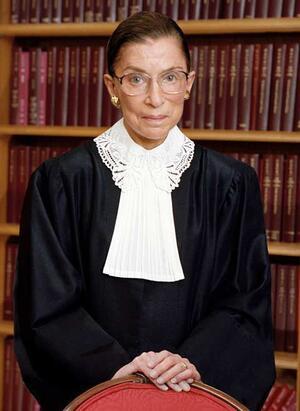Ruth Bader Ginsburg tells it like it is
If you haven't read it already, check out this excellent NYT interview with Supreme Court Justice Ruth Bader Ginsburg -- a JWA hero -- by Emily Bazelon (a senior editor at Slate, a founder of their new online women's magazine, Double X, and a serious Jewess with Attitude in her own right).
As usual, Ginsburg impresses me with how smart, forthright, and succinct she is in her answers. In reflecting on Sotomayor, she conveys clearly that every judge is influenced by all of his or her life experiences: "Yes, women bring a different life experience to the table. All of our differences make the conference better. That I'm a woman, that's part of it, that I'm Jewish, that's part of it, that I grew up in Brooklyn, N.Y., and I went to summer camp in the Adirondacks, all these things are part of me." Later in the interview, she explains how she saw the influence of his life experience as a grandfather in Rehnquist's decisions -- an important illustration of the ways in which "identity" is not an attribute solely of women or minorities.
I also appreciated her candid discussion of how she benefited from affirmative action, and of the importance of learning how to work with men: "I always thought that there was nothing an antifeminist would want more than to have women only in women's organizations, in their own little corner empathizing with each other and not touching a man's world. If you're going to change things, you have to be with the people who hold the levers."
Ginsburg is similarly frank about her own gentle yet savvy personal style: "It will be welcomed much more if you have a gentle touch than if you are aggressive." I found this particularly interesting because it reminded me of what Ginsburg has said about one of her own role models, Henrietta Szold. Upon the death of her mother in 1916, Szold wrote a beautiful letter to a male friend of the family who had offered to say kaddish on her behalf. Szold refused his offer and explained -- gently, persuasively -- her reasons for saying kaddish herself, a practice that was quite unconventional for a woman at that time. Reflecting on Szold's letter, Ginsburg wrote in her statement for JWA's Jewish Women and the Feminist Revolution exhibit, "Szold's plea for celebration of our common heritage while tolerating, indeed appreciating, the difference samong us concerning religious practice is captivating. I recall her words even to this day when a colleague's position betrays a certain lack of understanding."
I like to think of Ginsburg mentally invoking Henrietta Szold as she sits on the bench. I can imagine Szold's ghostly presence there, sitting in her dignified way behind Ginsburg's chair, and I wonder what other ghosts -- community leaders, mothers, wives, daughters, still living or long gone -- hover over the most powerful court, whispering their wisdom into the ears of the Justices.







